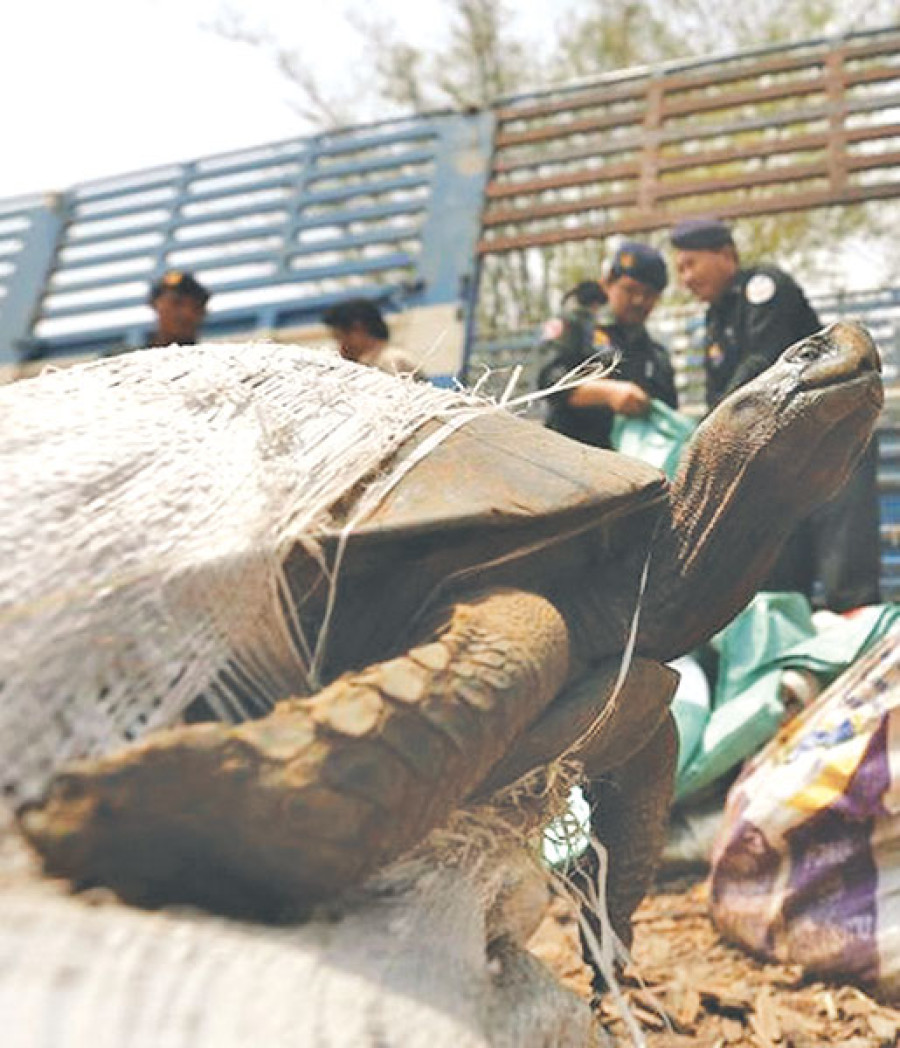Thu, Mar 5, 2026
Opinion
Shady business
Despite rampant smuggling of rare species there is no law that protects foreign species in India
bookmark
Maneka Sanjay Gandhi
Published at : August 5, 2018
Updated at : August 5, 2018 08:51
A restaurant in Lokhandwala, Mumbai has a large cage at the entrance with two pygmy monkeys in it. I sent a member of the state animal welfare board to arrest the owners. The forest department refused to help saying there was no law to confiscate foreign monkeys or arrest the owners. These smugglers will continue to display these severely endangered monkeys till I find a way to shut them down.
Last month a “pet fair” took place in Pune. It displayed exotic birds, fish and pedigreed dogs. It had no permissions and yet the police and the forest department took no action because they claim there is no law that protects foreign species in India. The smugglers who ran the fair looked on smugly as animal activists cried themselves hoarse.
Three months ago a person’s house was raided in Bangalore. He was found with three ball pythons. The forest department refused to register a case saying there was no law which covered foreign snakes. The man absconded with the snakes and released them in the open, while the inspectors were still arguing.
The nexus
Go to a normal illegal petshop—illegal because no shops in this country are licensed to sell animals. You will find dozens of exotic species. From macaws to snakes and snails and spiders. Hundreds of exotic fish, birds, animals, are for sale on the internet. Macaws from Bolivia, Argentina and Mexico, fish or turtles from all over the world. How did these get into India? There is a direct nexus between smugglers and our Indian customs departments. They come in containers from Singapore and pass easily through customs at the ports, especially Kolkata, Mumbai and Chennai.
The smaller animals come even through airports. Bangalore is notorious for its customs officers. One woman officer from the Northeast was caught running an illegal smuggling ring herself, in which her partner would go to Thailand, pick up animals and bring them in, on the days she was on duty. After I complained, she was removed from there but still holds her job somewhere and is probably doing the same thing.
The fault is with the Ministry for Environment, which ceased to exist as a functioning body 20 years ago and is now just another dead body whose officials go abroad once a week to waste India’s money. The Wildlife Crime Bureau, which was invented to fight these kinds of crime, has repeatedly asked the Ministry to amend the laws and put the smuggling/sale/buying of exotic species as a criminal offence. They do nothing. In order to delay any action, and perhaps protect smugglers, they keep making committees to review the Wildlife Protection Act 1972.
In the meantime smuggling and transactions of foreign species worth 8-10 crores take place every day. You can go to jail for keeping a rosy ringed parakeet or a myna in your house. But not if you keep Cockatiels, African Grey Parrots or Lorikeets.
All exotic species that are smuggled into India are endangered species of which there are only a few thousand left. They are banned for capture in their own countries and are on the prohibited list of the Convention on International Trade in Endangered Species of Wild Fauna and Flora (CITES). The International Union for Conservation of Nature ( IUCN) lists all of them as endangered species. The Military Macaw is found only in a few miles of forest between Argentina and Mexico. Even the Lovebirds are little parrots brought in from Australia. They die en route in the thousands. The rest last less than a year, as they cannot take any temperature variations and no form of cold. Yet you continue to buy them.
Australia has put them on the endangered species list and no one in that country can buy them. But China and India are swallowing them wholesale. The Zoological Survey of India, the Central Zoo Authority, the wildlife department of each state, the Wildlife Crime Control Bureau, sit by and watch silently. No action is taken on this massive criminal activity because the Ministry for Environment and Forests will not make rules.
Act immediately
In Delhi, the Capital of India where all the lawmakers live, you can get anything easily. We have one Chief Wildlife Warden whose entire office consists of two inspectors and none of them will stir out of their offices no matter what the crisis. I can pick up any exotic species I want – from Tarantula spiders, black squirrels, rattlesnakes from the American desert, any kind of wild cat, turtle or emu. There is a person in Mehrauli, who partners a politician, who sells these from his basement. When he was raided, the forest department refused to arrest him on the grounds that all these were exotic.
This trade in wild animals, their articles, trophies cured/uncured etc., is in complete violation of national and international guidelines such as CITES and legislations such as the Wildlife Protection Act, 1972 and Prevention of Cruelty to Animals Act, 1960 etc.
None of the dealers have any licences, permits - and they don’t need them because all the authorities look the other way using the loophole in the Wildlife Act 1972.
We have signed the CITES treaty but we still don’t have an office 40 years later and the Customs people, who are raking in the money, refuse to learn or apply it. CITES makes the trade of foreign birds and animals illegal, but the forest departments and Customs are blasé about it.
We need rules on exotic species and we need them now. We need to strengthen the Wildlife Crime Control Bureau. There are three nations that are destroying all the species of the world by encouraging and allowing foreign species to come into their countries: America, China and India.
To join the animal welfare movement contact [email protected], www.peopleforanimalsindia.org
Most Read from Opinion
Editor's Picks
Can Gagan Thapa convince Nepal that experience still matters?
How Facebook’s algorithm is amplifying one party over all others
Five and half decades of KP Oli in Nepali politics
Nepal’s IT exports near $1 billion. Can the momentum be sustained?
Parties’ lofty pledges on economy collide with hard realities
E-PAPER | March 05, 2026
×




 25.15°C Kathmandu
25.15°C Kathmandu





.jpg&w=200&height=120)





